Accounting Theory
VerifiedAdded on 2023/01/19
|11
|2890
|83
AI Summary
This document discusses the concept of accounting theory and its application in the business world. It explores environmental and social issues, stakeholder theories, and the role of legitimacy theory in sustainable business practices. The case study focuses on Paradise Plantations LTD and its efforts to adopt sustainable business practices in the Sri Lankan tea industry.
Contribute Materials
Your contribution can guide someone’s learning journey. Share your
documents today.
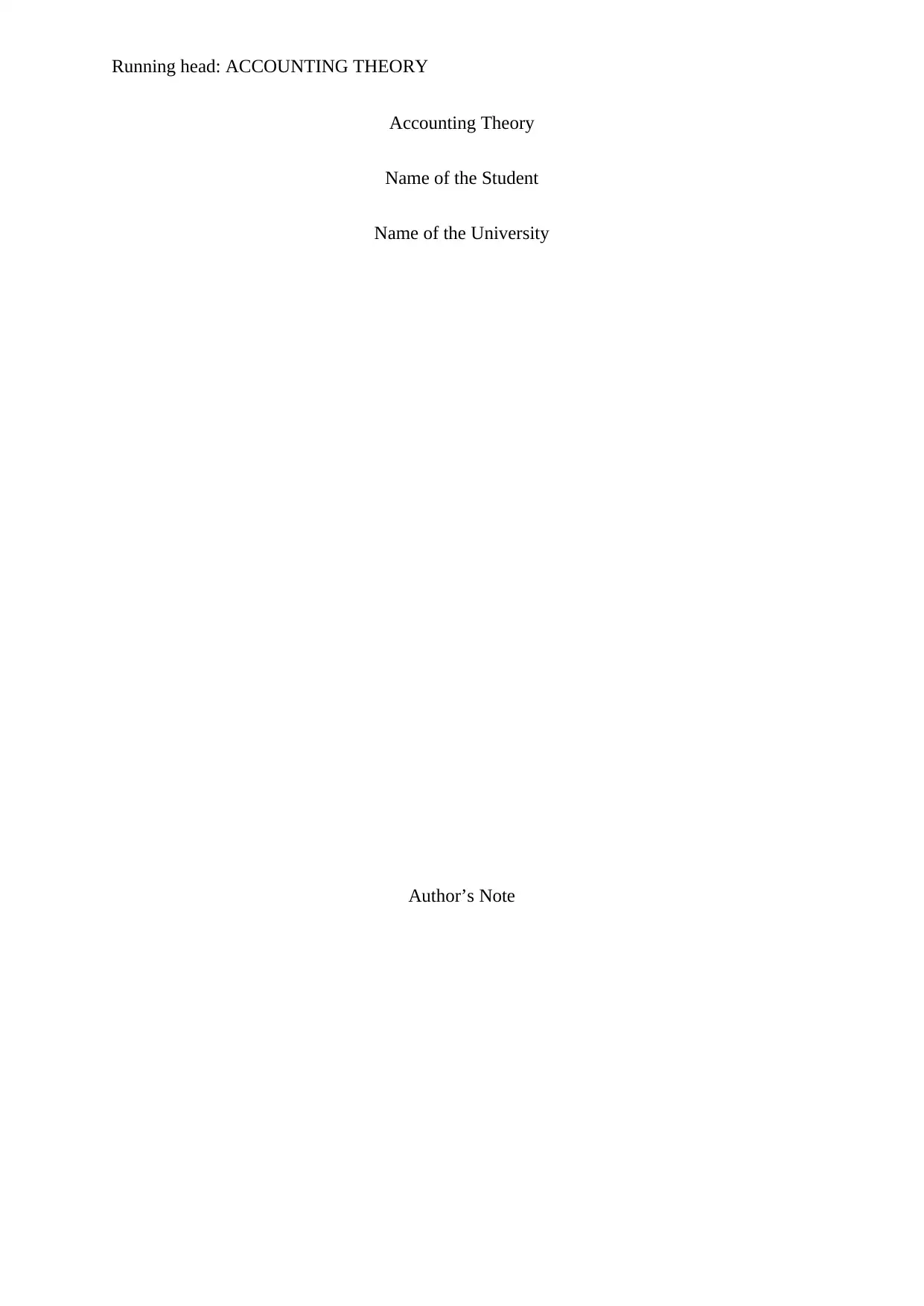
Running head: ACCOUNTING THEORY
Accounting Theory
Name of the Student
Name of the University
Author’s Note
Accounting Theory
Name of the Student
Name of the University
Author’s Note
Secure Best Marks with AI Grader
Need help grading? Try our AI Grader for instant feedback on your assignments.
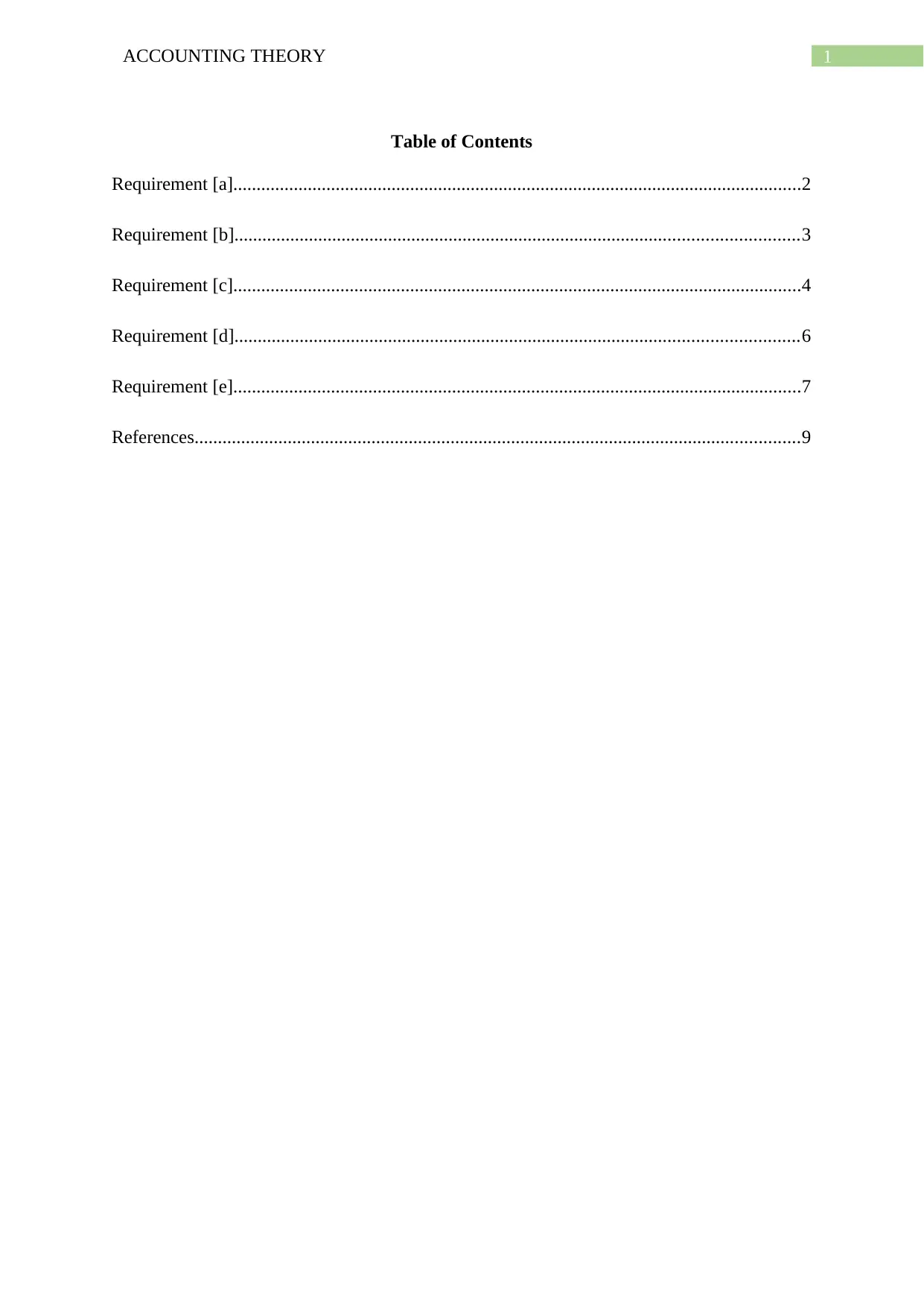
1ACCOUNTING THEORY
Table of Contents
Requirement [a]..........................................................................................................................2
Requirement [b].........................................................................................................................3
Requirement [c]..........................................................................................................................4
Requirement [d].........................................................................................................................6
Requirement [e]..........................................................................................................................7
References..................................................................................................................................9
Table of Contents
Requirement [a]..........................................................................................................................2
Requirement [b].........................................................................................................................3
Requirement [c]..........................................................................................................................4
Requirement [d].........................................................................................................................6
Requirement [e]..........................................................................................................................7
References..................................................................................................................................9
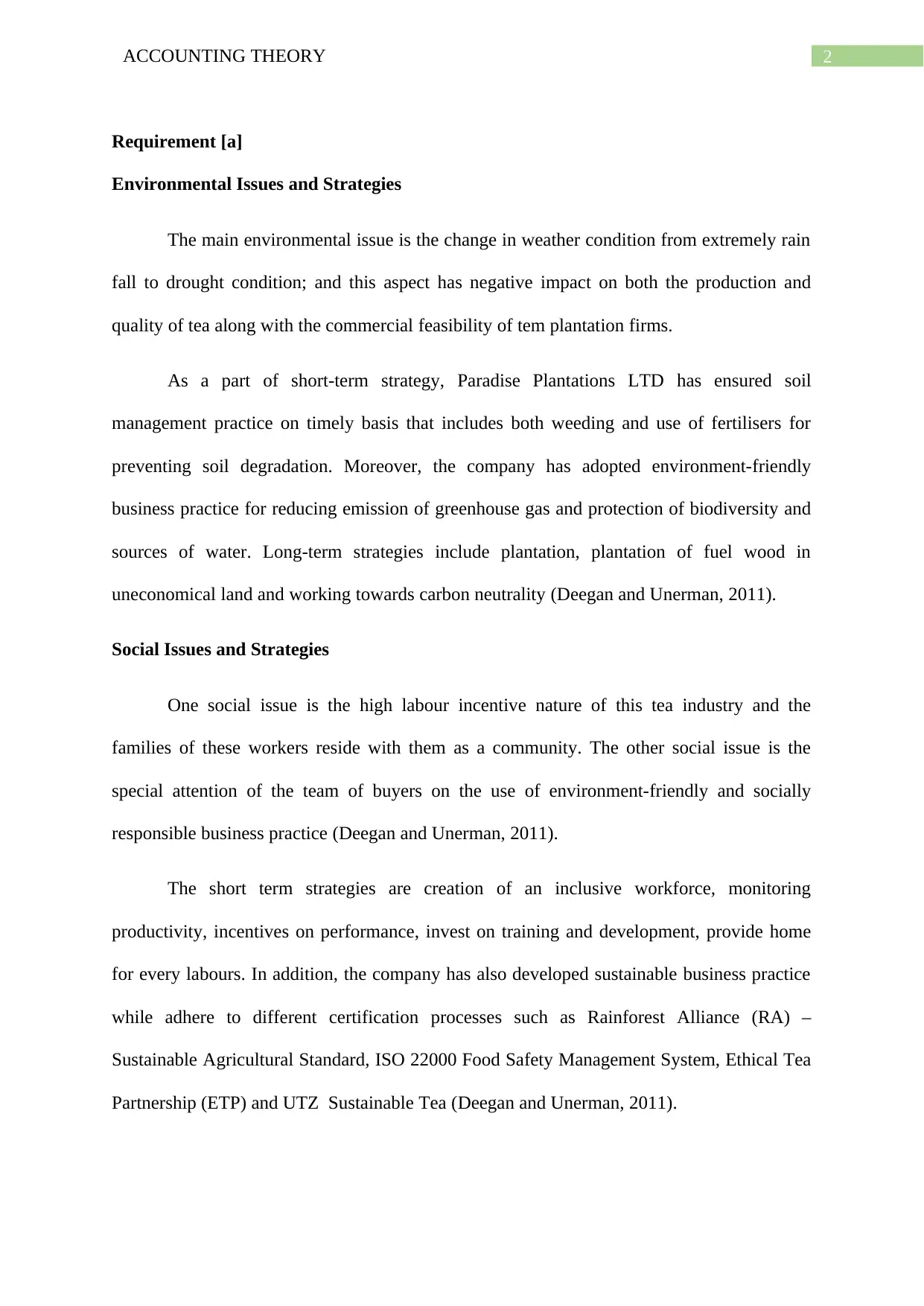
2ACCOUNTING THEORY
Requirement [a]
Environmental Issues and Strategies
The main environmental issue is the change in weather condition from extremely rain
fall to drought condition; and this aspect has negative impact on both the production and
quality of tea along with the commercial feasibility of tem plantation firms.
As a part of short-term strategy, Paradise Plantations LTD has ensured soil
management practice on timely basis that includes both weeding and use of fertilisers for
preventing soil degradation. Moreover, the company has adopted environment-friendly
business practice for reducing emission of greenhouse gas and protection of biodiversity and
sources of water. Long-term strategies include plantation, plantation of fuel wood in
uneconomical land and working towards carbon neutrality (Deegan and Unerman, 2011).
Social Issues and Strategies
One social issue is the high labour incentive nature of this tea industry and the
families of these workers reside with them as a community. The other social issue is the
special attention of the team of buyers on the use of environment-friendly and socially
responsible business practice (Deegan and Unerman, 2011).
The short term strategies are creation of an inclusive workforce, monitoring
productivity, incentives on performance, invest on training and development, provide home
for every labours. In addition, the company has also developed sustainable business practice
while adhere to different certification processes such as Rainforest Alliance (RA) –
Sustainable Agricultural Standard, ISO 22000 Food Safety Management System, Ethical Tea
Partnership (ETP) and UTZ Sustainable Tea (Deegan and Unerman, 2011).
Requirement [a]
Environmental Issues and Strategies
The main environmental issue is the change in weather condition from extremely rain
fall to drought condition; and this aspect has negative impact on both the production and
quality of tea along with the commercial feasibility of tem plantation firms.
As a part of short-term strategy, Paradise Plantations LTD has ensured soil
management practice on timely basis that includes both weeding and use of fertilisers for
preventing soil degradation. Moreover, the company has adopted environment-friendly
business practice for reducing emission of greenhouse gas and protection of biodiversity and
sources of water. Long-term strategies include plantation, plantation of fuel wood in
uneconomical land and working towards carbon neutrality (Deegan and Unerman, 2011).
Social Issues and Strategies
One social issue is the high labour incentive nature of this tea industry and the
families of these workers reside with them as a community. The other social issue is the
special attention of the team of buyers on the use of environment-friendly and socially
responsible business practice (Deegan and Unerman, 2011).
The short term strategies are creation of an inclusive workforce, monitoring
productivity, incentives on performance, invest on training and development, provide home
for every labours. In addition, the company has also developed sustainable business practice
while adhere to different certification processes such as Rainforest Alliance (RA) –
Sustainable Agricultural Standard, ISO 22000 Food Safety Management System, Ethical Tea
Partnership (ETP) and UTZ Sustainable Tea (Deegan and Unerman, 2011).
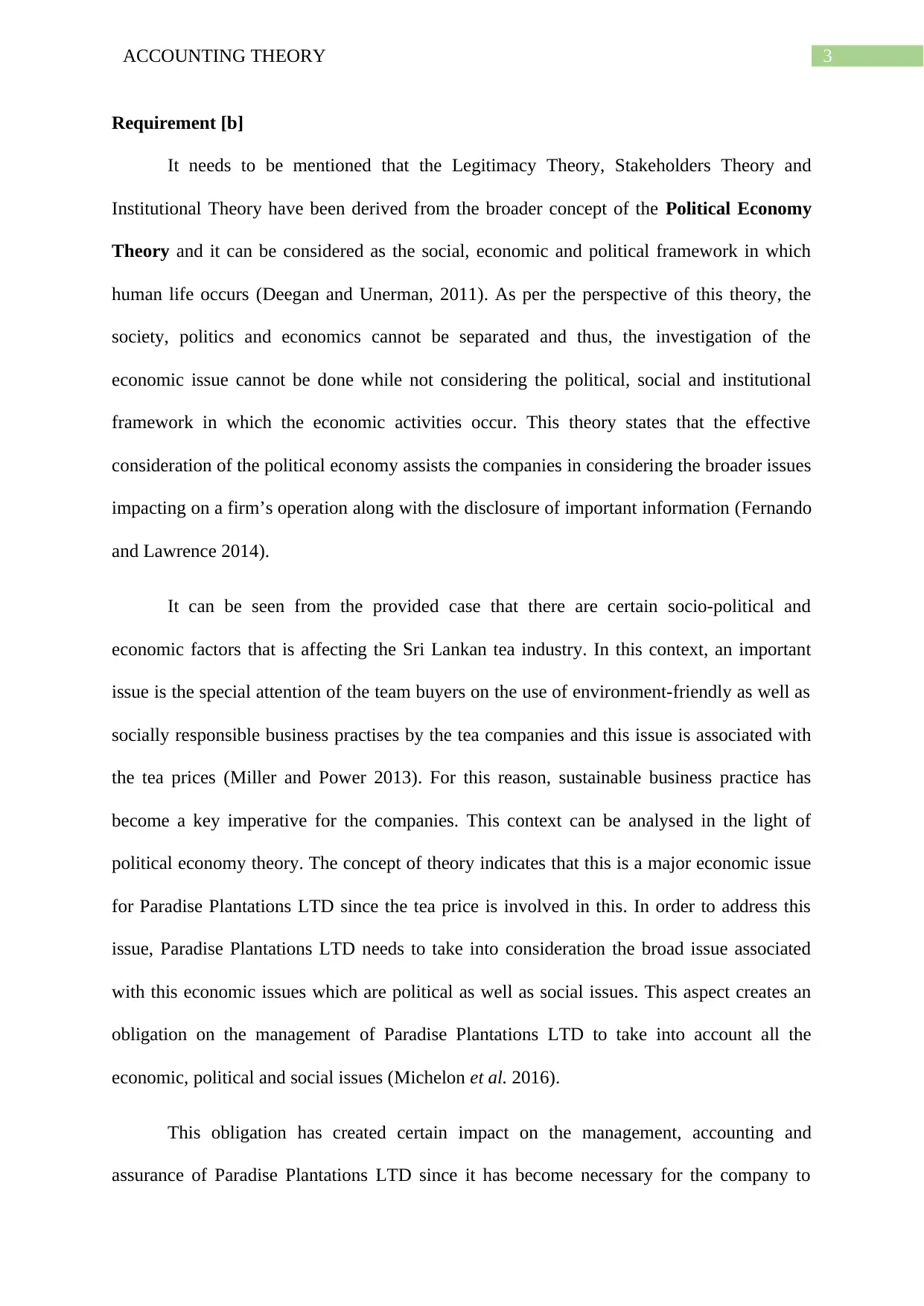
3ACCOUNTING THEORY
Requirement [b]
It needs to be mentioned that the Legitimacy Theory, Stakeholders Theory and
Institutional Theory have been derived from the broader concept of the Political Economy
Theory and it can be considered as the social, economic and political framework in which
human life occurs (Deegan and Unerman, 2011). As per the perspective of this theory, the
society, politics and economics cannot be separated and thus, the investigation of the
economic issue cannot be done while not considering the political, social and institutional
framework in which the economic activities occur. This theory states that the effective
consideration of the political economy assists the companies in considering the broader issues
impacting on a firm’s operation along with the disclosure of important information (Fernando
and Lawrence 2014).
It can be seen from the provided case that there are certain socio-political and
economic factors that is affecting the Sri Lankan tea industry. In this context, an important
issue is the special attention of the team buyers on the use of environment-friendly as well as
socially responsible business practises by the tea companies and this issue is associated with
the tea prices (Miller and Power 2013). For this reason, sustainable business practice has
become a key imperative for the companies. This context can be analysed in the light of
political economy theory. The concept of theory indicates that this is a major economic issue
for Paradise Plantations LTD since the tea price is involved in this. In order to address this
issue, Paradise Plantations LTD needs to take into consideration the broad issue associated
with this economic issues which are political as well as social issues. This aspect creates an
obligation on the management of Paradise Plantations LTD to take into account all the
economic, political and social issues (Michelon et al. 2016).
This obligation has created certain impact on the management, accounting and
assurance of Paradise Plantations LTD since it has become necessary for the company to
Requirement [b]
It needs to be mentioned that the Legitimacy Theory, Stakeholders Theory and
Institutional Theory have been derived from the broader concept of the Political Economy
Theory and it can be considered as the social, economic and political framework in which
human life occurs (Deegan and Unerman, 2011). As per the perspective of this theory, the
society, politics and economics cannot be separated and thus, the investigation of the
economic issue cannot be done while not considering the political, social and institutional
framework in which the economic activities occur. This theory states that the effective
consideration of the political economy assists the companies in considering the broader issues
impacting on a firm’s operation along with the disclosure of important information (Fernando
and Lawrence 2014).
It can be seen from the provided case that there are certain socio-political and
economic factors that is affecting the Sri Lankan tea industry. In this context, an important
issue is the special attention of the team buyers on the use of environment-friendly as well as
socially responsible business practises by the tea companies and this issue is associated with
the tea prices (Miller and Power 2013). For this reason, sustainable business practice has
become a key imperative for the companies. This context can be analysed in the light of
political economy theory. The concept of theory indicates that this is a major economic issue
for Paradise Plantations LTD since the tea price is involved in this. In order to address this
issue, Paradise Plantations LTD needs to take into consideration the broad issue associated
with this economic issues which are political as well as social issues. This aspect creates an
obligation on the management of Paradise Plantations LTD to take into account all the
economic, political and social issues (Michelon et al. 2016).
This obligation has created certain impact on the management, accounting and
assurance of Paradise Plantations LTD since it has become necessary for the company to
Secure Best Marks with AI Grader
Need help grading? Try our AI Grader for instant feedback on your assignments.
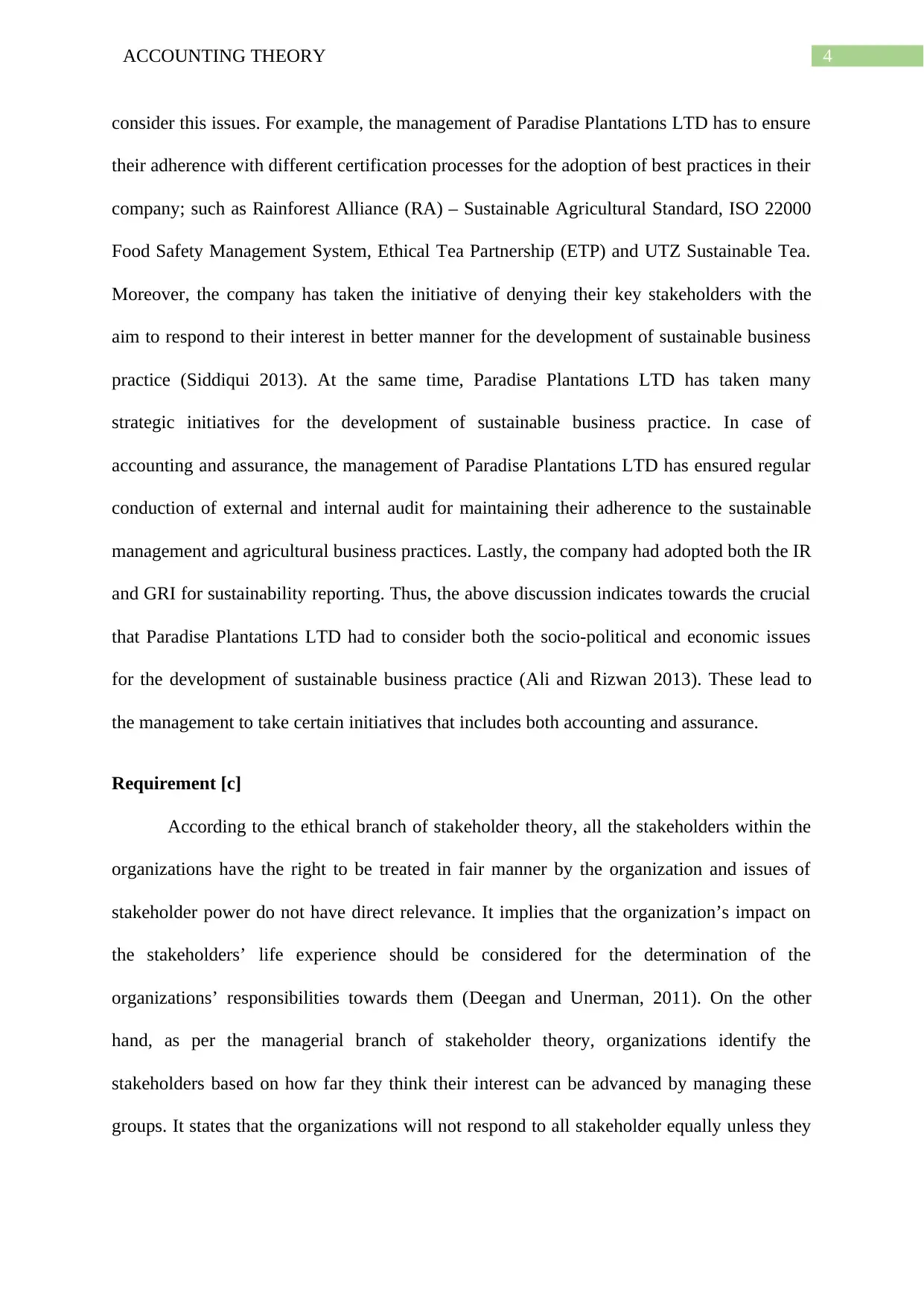
4ACCOUNTING THEORY
consider this issues. For example, the management of Paradise Plantations LTD has to ensure
their adherence with different certification processes for the adoption of best practices in their
company; such as Rainforest Alliance (RA) – Sustainable Agricultural Standard, ISO 22000
Food Safety Management System, Ethical Tea Partnership (ETP) and UTZ Sustainable Tea.
Moreover, the company has taken the initiative of denying their key stakeholders with the
aim to respond to their interest in better manner for the development of sustainable business
practice (Siddiqui 2013). At the same time, Paradise Plantations LTD has taken many
strategic initiatives for the development of sustainable business practice. In case of
accounting and assurance, the management of Paradise Plantations LTD has ensured regular
conduction of external and internal audit for maintaining their adherence to the sustainable
management and agricultural business practices. Lastly, the company had adopted both the IR
and GRI for sustainability reporting. Thus, the above discussion indicates towards the crucial
that Paradise Plantations LTD had to consider both the socio-political and economic issues
for the development of sustainable business practice (Ali and Rizwan 2013). These lead to
the management to take certain initiatives that includes both accounting and assurance.
Requirement [c]
According to the ethical branch of stakeholder theory, all the stakeholders within the
organizations have the right to be treated in fair manner by the organization and issues of
stakeholder power do not have direct relevance. It implies that the organization’s impact on
the stakeholders’ life experience should be considered for the determination of the
organizations’ responsibilities towards them (Deegan and Unerman, 2011). On the other
hand, as per the managerial branch of stakeholder theory, organizations identify the
stakeholders based on how far they think their interest can be advanced by managing these
groups. It states that the organizations will not respond to all stakeholder equally unless they
consider this issues. For example, the management of Paradise Plantations LTD has to ensure
their adherence with different certification processes for the adoption of best practices in their
company; such as Rainforest Alliance (RA) – Sustainable Agricultural Standard, ISO 22000
Food Safety Management System, Ethical Tea Partnership (ETP) and UTZ Sustainable Tea.
Moreover, the company has taken the initiative of denying their key stakeholders with the
aim to respond to their interest in better manner for the development of sustainable business
practice (Siddiqui 2013). At the same time, Paradise Plantations LTD has taken many
strategic initiatives for the development of sustainable business practice. In case of
accounting and assurance, the management of Paradise Plantations LTD has ensured regular
conduction of external and internal audit for maintaining their adherence to the sustainable
management and agricultural business practices. Lastly, the company had adopted both the IR
and GRI for sustainability reporting. Thus, the above discussion indicates towards the crucial
that Paradise Plantations LTD had to consider both the socio-political and economic issues
for the development of sustainable business practice (Ali and Rizwan 2013). These lead to
the management to take certain initiatives that includes both accounting and assurance.
Requirement [c]
According to the ethical branch of stakeholder theory, all the stakeholders within the
organizations have the right to be treated in fair manner by the organization and issues of
stakeholder power do not have direct relevance. It implies that the organization’s impact on
the stakeholders’ life experience should be considered for the determination of the
organizations’ responsibilities towards them (Deegan and Unerman, 2011). On the other
hand, as per the managerial branch of stakeholder theory, organizations identify the
stakeholders based on how far they think their interest can be advanced by managing these
groups. It states that the organizations will not respond to all stakeholder equally unless they
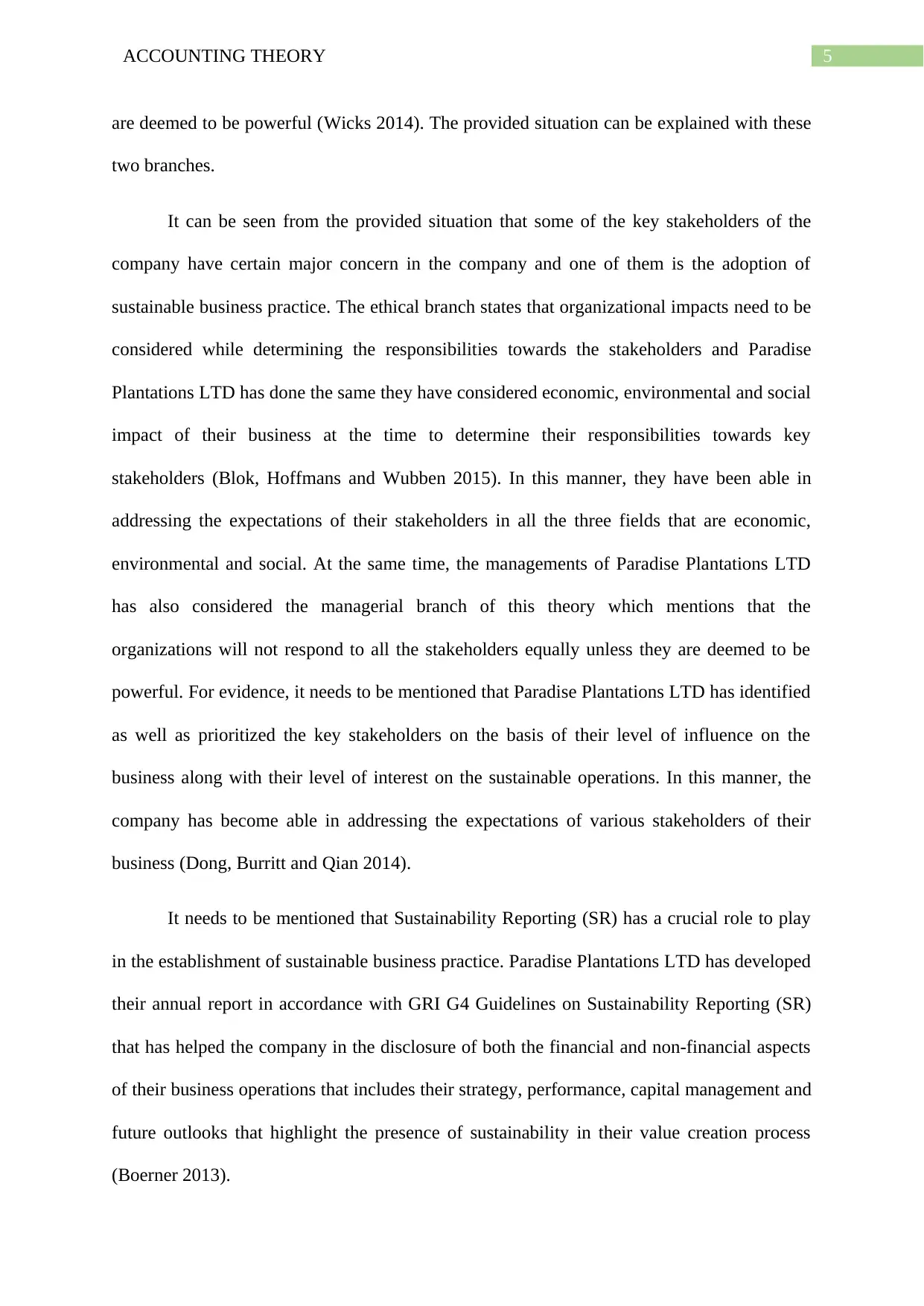
5ACCOUNTING THEORY
are deemed to be powerful (Wicks 2014). The provided situation can be explained with these
two branches.
It can be seen from the provided situation that some of the key stakeholders of the
company have certain major concern in the company and one of them is the adoption of
sustainable business practice. The ethical branch states that organizational impacts need to be
considered while determining the responsibilities towards the stakeholders and Paradise
Plantations LTD has done the same they have considered economic, environmental and social
impact of their business at the time to determine their responsibilities towards key
stakeholders (Blok, Hoffmans and Wubben 2015). In this manner, they have been able in
addressing the expectations of their stakeholders in all the three fields that are economic,
environmental and social. At the same time, the managements of Paradise Plantations LTD
has also considered the managerial branch of this theory which mentions that the
organizations will not respond to all the stakeholders equally unless they are deemed to be
powerful. For evidence, it needs to be mentioned that Paradise Plantations LTD has identified
as well as prioritized the key stakeholders on the basis of their level of influence on the
business along with their level of interest on the sustainable operations. In this manner, the
company has become able in addressing the expectations of various stakeholders of their
business (Dong, Burritt and Qian 2014).
It needs to be mentioned that Sustainability Reporting (SR) has a crucial role to play
in the establishment of sustainable business practice. Paradise Plantations LTD has developed
their annual report in accordance with GRI G4 Guidelines on Sustainability Reporting (SR)
that has helped the company in the disclosure of both the financial and non-financial aspects
of their business operations that includes their strategy, performance, capital management and
future outlooks that highlight the presence of sustainability in their value creation process
(Boerner 2013).
are deemed to be powerful (Wicks 2014). The provided situation can be explained with these
two branches.
It can be seen from the provided situation that some of the key stakeholders of the
company have certain major concern in the company and one of them is the adoption of
sustainable business practice. The ethical branch states that organizational impacts need to be
considered while determining the responsibilities towards the stakeholders and Paradise
Plantations LTD has done the same they have considered economic, environmental and social
impact of their business at the time to determine their responsibilities towards key
stakeholders (Blok, Hoffmans and Wubben 2015). In this manner, they have been able in
addressing the expectations of their stakeholders in all the three fields that are economic,
environmental and social. At the same time, the managements of Paradise Plantations LTD
has also considered the managerial branch of this theory which mentions that the
organizations will not respond to all the stakeholders equally unless they are deemed to be
powerful. For evidence, it needs to be mentioned that Paradise Plantations LTD has identified
as well as prioritized the key stakeholders on the basis of their level of influence on the
business along with their level of interest on the sustainable operations. In this manner, the
company has become able in addressing the expectations of various stakeholders of their
business (Dong, Burritt and Qian 2014).
It needs to be mentioned that Sustainability Reporting (SR) has a crucial role to play
in the establishment of sustainable business practice. Paradise Plantations LTD has developed
their annual report in accordance with GRI G4 Guidelines on Sustainability Reporting (SR)
that has helped the company in the disclosure of both the financial and non-financial aspects
of their business operations that includes their strategy, performance, capital management and
future outlooks that highlight the presence of sustainability in their value creation process
(Boerner 2013).
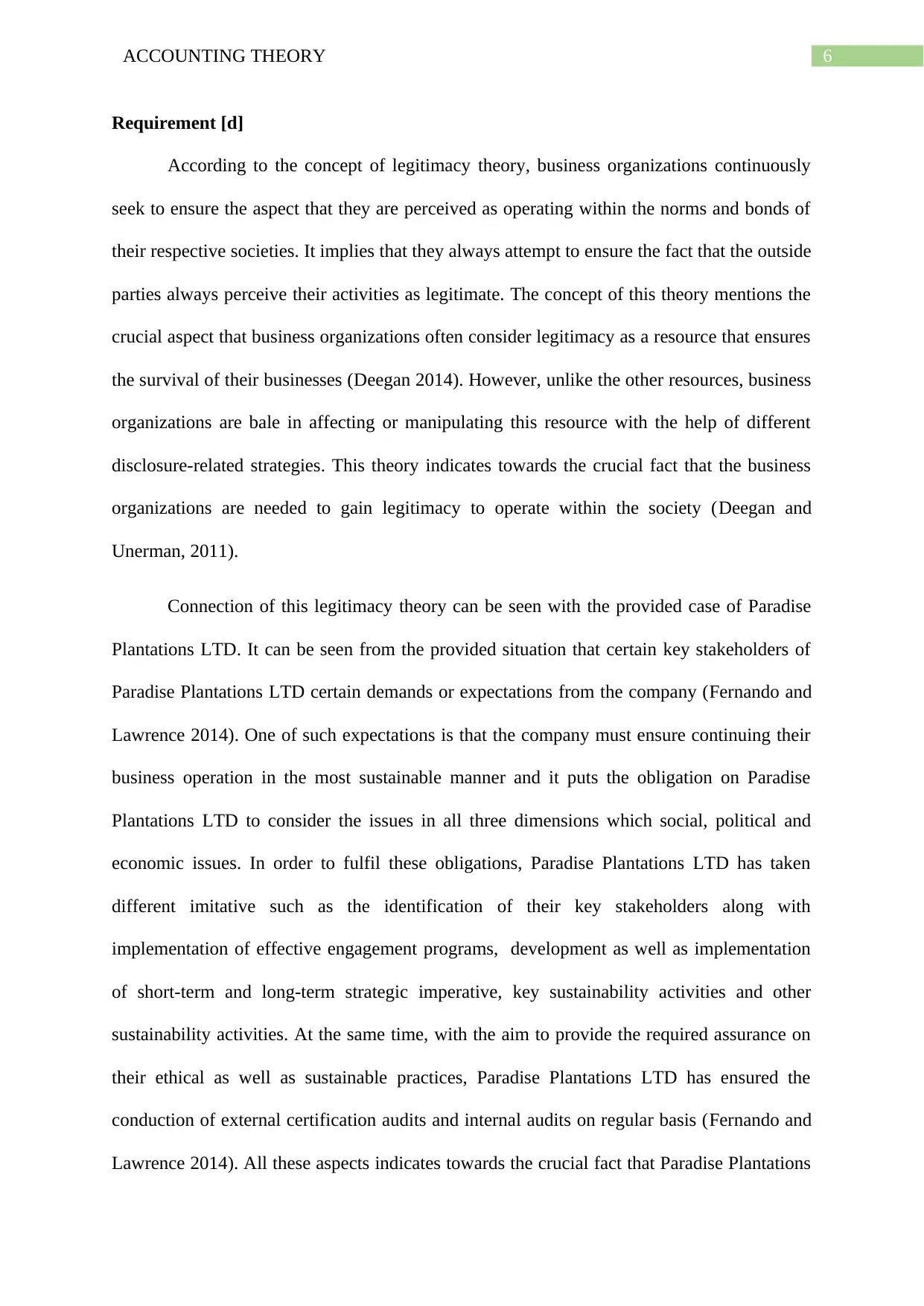
6ACCOUNTING THEORY
Requirement [d]
According to the concept of legitimacy theory, business organizations continuously
seek to ensure the aspect that they are perceived as operating within the norms and bonds of
their respective societies. It implies that they always attempt to ensure the fact that the outside
parties always perceive their activities as legitimate. The concept of this theory mentions the
crucial aspect that business organizations often consider legitimacy as a resource that ensures
the survival of their businesses (Deegan 2014). However, unlike the other resources, business
organizations are bale in affecting or manipulating this resource with the help of different
disclosure-related strategies. This theory indicates towards the crucial fact that the business
organizations are needed to gain legitimacy to operate within the society (Deegan and
Unerman, 2011).
Connection of this legitimacy theory can be seen with the provided case of Paradise
Plantations LTD. It can be seen from the provided situation that certain key stakeholders of
Paradise Plantations LTD certain demands or expectations from the company (Fernando and
Lawrence 2014). One of such expectations is that the company must ensure continuing their
business operation in the most sustainable manner and it puts the obligation on Paradise
Plantations LTD to consider the issues in all three dimensions which social, political and
economic issues. In order to fulfil these obligations, Paradise Plantations LTD has taken
different imitative such as the identification of their key stakeholders along with
implementation of effective engagement programs, development as well as implementation
of short-term and long-term strategic imperative, key sustainability activities and other
sustainability activities. At the same time, with the aim to provide the required assurance on
their ethical as well as sustainable practices, Paradise Plantations LTD has ensured the
conduction of external certification audits and internal audits on regular basis (Fernando and
Lawrence 2014). All these aspects indicates towards the crucial fact that Paradise Plantations
Requirement [d]
According to the concept of legitimacy theory, business organizations continuously
seek to ensure the aspect that they are perceived as operating within the norms and bonds of
their respective societies. It implies that they always attempt to ensure the fact that the outside
parties always perceive their activities as legitimate. The concept of this theory mentions the
crucial aspect that business organizations often consider legitimacy as a resource that ensures
the survival of their businesses (Deegan 2014). However, unlike the other resources, business
organizations are bale in affecting or manipulating this resource with the help of different
disclosure-related strategies. This theory indicates towards the crucial fact that the business
organizations are needed to gain legitimacy to operate within the society (Deegan and
Unerman, 2011).
Connection of this legitimacy theory can be seen with the provided case of Paradise
Plantations LTD. It can be seen from the provided situation that certain key stakeholders of
Paradise Plantations LTD certain demands or expectations from the company (Fernando and
Lawrence 2014). One of such expectations is that the company must ensure continuing their
business operation in the most sustainable manner and it puts the obligation on Paradise
Plantations LTD to consider the issues in all three dimensions which social, political and
economic issues. In order to fulfil these obligations, Paradise Plantations LTD has taken
different imitative such as the identification of their key stakeholders along with
implementation of effective engagement programs, development as well as implementation
of short-term and long-term strategic imperative, key sustainability activities and other
sustainability activities. At the same time, with the aim to provide the required assurance on
their ethical as well as sustainable practices, Paradise Plantations LTD has ensured the
conduction of external certification audits and internal audits on regular basis (Fernando and
Lawrence 2014). All these aspects indicates towards the crucial fact that Paradise Plantations
Paraphrase This Document
Need a fresh take? Get an instant paraphrase of this document with our AI Paraphraser
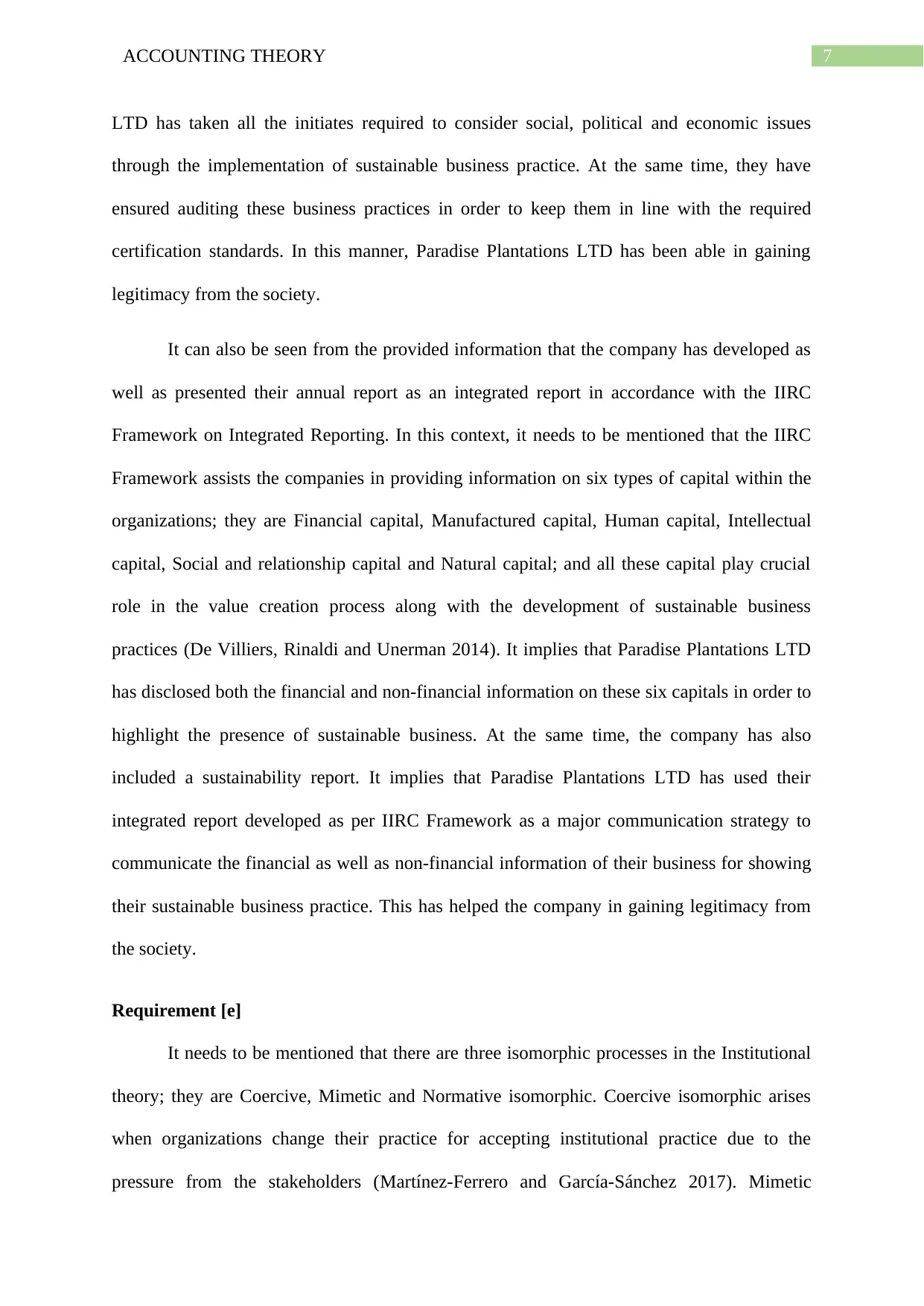
7ACCOUNTING THEORY
LTD has taken all the initiates required to consider social, political and economic issues
through the implementation of sustainable business practice. At the same time, they have
ensured auditing these business practices in order to keep them in line with the required
certification standards. In this manner, Paradise Plantations LTD has been able in gaining
legitimacy from the society.
It can also be seen from the provided information that the company has developed as
well as presented their annual report as an integrated report in accordance with the IIRC
Framework on Integrated Reporting. In this context, it needs to be mentioned that the IIRC
Framework assists the companies in providing information on six types of capital within the
organizations; they are Financial capital, Manufactured capital, Human capital, Intellectual
capital, Social and relationship capital and Natural capital; and all these capital play crucial
role in the value creation process along with the development of sustainable business
practices (De Villiers, Rinaldi and Unerman 2014). It implies that Paradise Plantations LTD
has disclosed both the financial and non-financial information on these six capitals in order to
highlight the presence of sustainable business. At the same time, the company has also
included a sustainability report. It implies that Paradise Plantations LTD has used their
integrated report developed as per IIRC Framework as a major communication strategy to
communicate the financial as well as non-financial information of their business for showing
their sustainable business practice. This has helped the company in gaining legitimacy from
the society.
Requirement [e]
It needs to be mentioned that there are three isomorphic processes in the Institutional
theory; they are Coercive, Mimetic and Normative isomorphic. Coercive isomorphic arises
when organizations change their practice for accepting institutional practice due to the
pressure from the stakeholders (Martínez-Ferrero and García-Sánchez 2017). Mimetic
LTD has taken all the initiates required to consider social, political and economic issues
through the implementation of sustainable business practice. At the same time, they have
ensured auditing these business practices in order to keep them in line with the required
certification standards. In this manner, Paradise Plantations LTD has been able in gaining
legitimacy from the society.
It can also be seen from the provided information that the company has developed as
well as presented their annual report as an integrated report in accordance with the IIRC
Framework on Integrated Reporting. In this context, it needs to be mentioned that the IIRC
Framework assists the companies in providing information on six types of capital within the
organizations; they are Financial capital, Manufactured capital, Human capital, Intellectual
capital, Social and relationship capital and Natural capital; and all these capital play crucial
role in the value creation process along with the development of sustainable business
practices (De Villiers, Rinaldi and Unerman 2014). It implies that Paradise Plantations LTD
has disclosed both the financial and non-financial information on these six capitals in order to
highlight the presence of sustainable business. At the same time, the company has also
included a sustainability report. It implies that Paradise Plantations LTD has used their
integrated report developed as per IIRC Framework as a major communication strategy to
communicate the financial as well as non-financial information of their business for showing
their sustainable business practice. This has helped the company in gaining legitimacy from
the society.
Requirement [e]
It needs to be mentioned that there are three isomorphic processes in the Institutional
theory; they are Coercive, Mimetic and Normative isomorphic. Coercive isomorphic arises
when organizations change their practice for accepting institutional practice due to the
pressure from the stakeholders (Martínez-Ferrero and García-Sánchez 2017). Mimetic
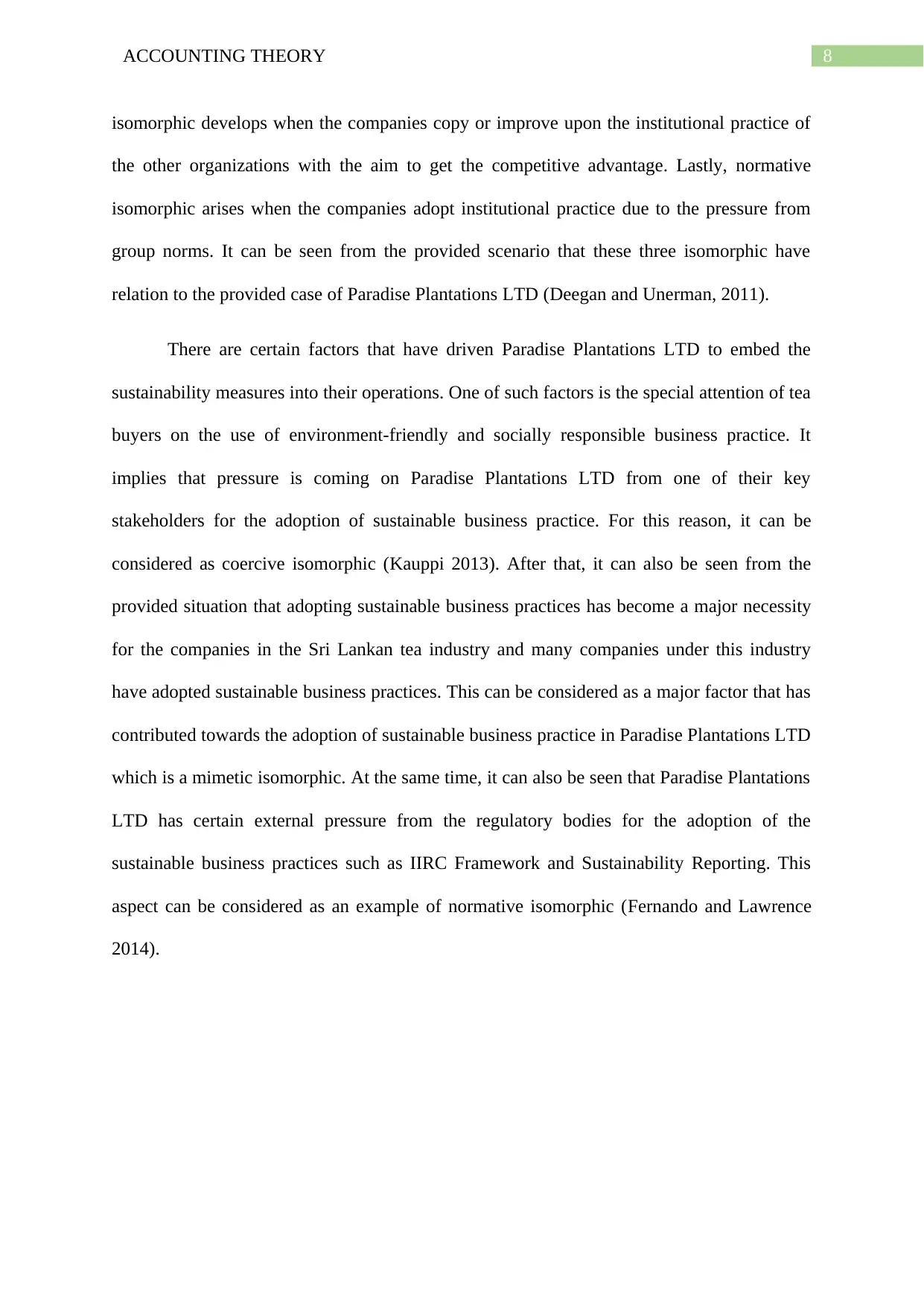
8ACCOUNTING THEORY
isomorphic develops when the companies copy or improve upon the institutional practice of
the other organizations with the aim to get the competitive advantage. Lastly, normative
isomorphic arises when the companies adopt institutional practice due to the pressure from
group norms. It can be seen from the provided scenario that these three isomorphic have
relation to the provided case of Paradise Plantations LTD (Deegan and Unerman, 2011).
There are certain factors that have driven Paradise Plantations LTD to embed the
sustainability measures into their operations. One of such factors is the special attention of tea
buyers on the use of environment-friendly and socially responsible business practice. It
implies that pressure is coming on Paradise Plantations LTD from one of their key
stakeholders for the adoption of sustainable business practice. For this reason, it can be
considered as coercive isomorphic (Kauppi 2013). After that, it can also be seen from the
provided situation that adopting sustainable business practices has become a major necessity
for the companies in the Sri Lankan tea industry and many companies under this industry
have adopted sustainable business practices. This can be considered as a major factor that has
contributed towards the adoption of sustainable business practice in Paradise Plantations LTD
which is a mimetic isomorphic. At the same time, it can also be seen that Paradise Plantations
LTD has certain external pressure from the regulatory bodies for the adoption of the
sustainable business practices such as IIRC Framework and Sustainability Reporting. This
aspect can be considered as an example of normative isomorphic (Fernando and Lawrence
2014).
isomorphic develops when the companies copy or improve upon the institutional practice of
the other organizations with the aim to get the competitive advantage. Lastly, normative
isomorphic arises when the companies adopt institutional practice due to the pressure from
group norms. It can be seen from the provided scenario that these three isomorphic have
relation to the provided case of Paradise Plantations LTD (Deegan and Unerman, 2011).
There are certain factors that have driven Paradise Plantations LTD to embed the
sustainability measures into their operations. One of such factors is the special attention of tea
buyers on the use of environment-friendly and socially responsible business practice. It
implies that pressure is coming on Paradise Plantations LTD from one of their key
stakeholders for the adoption of sustainable business practice. For this reason, it can be
considered as coercive isomorphic (Kauppi 2013). After that, it can also be seen from the
provided situation that adopting sustainable business practices has become a major necessity
for the companies in the Sri Lankan tea industry and many companies under this industry
have adopted sustainable business practices. This can be considered as a major factor that has
contributed towards the adoption of sustainable business practice in Paradise Plantations LTD
which is a mimetic isomorphic. At the same time, it can also be seen that Paradise Plantations
LTD has certain external pressure from the regulatory bodies for the adoption of the
sustainable business practices such as IIRC Framework and Sustainability Reporting. This
aspect can be considered as an example of normative isomorphic (Fernando and Lawrence
2014).
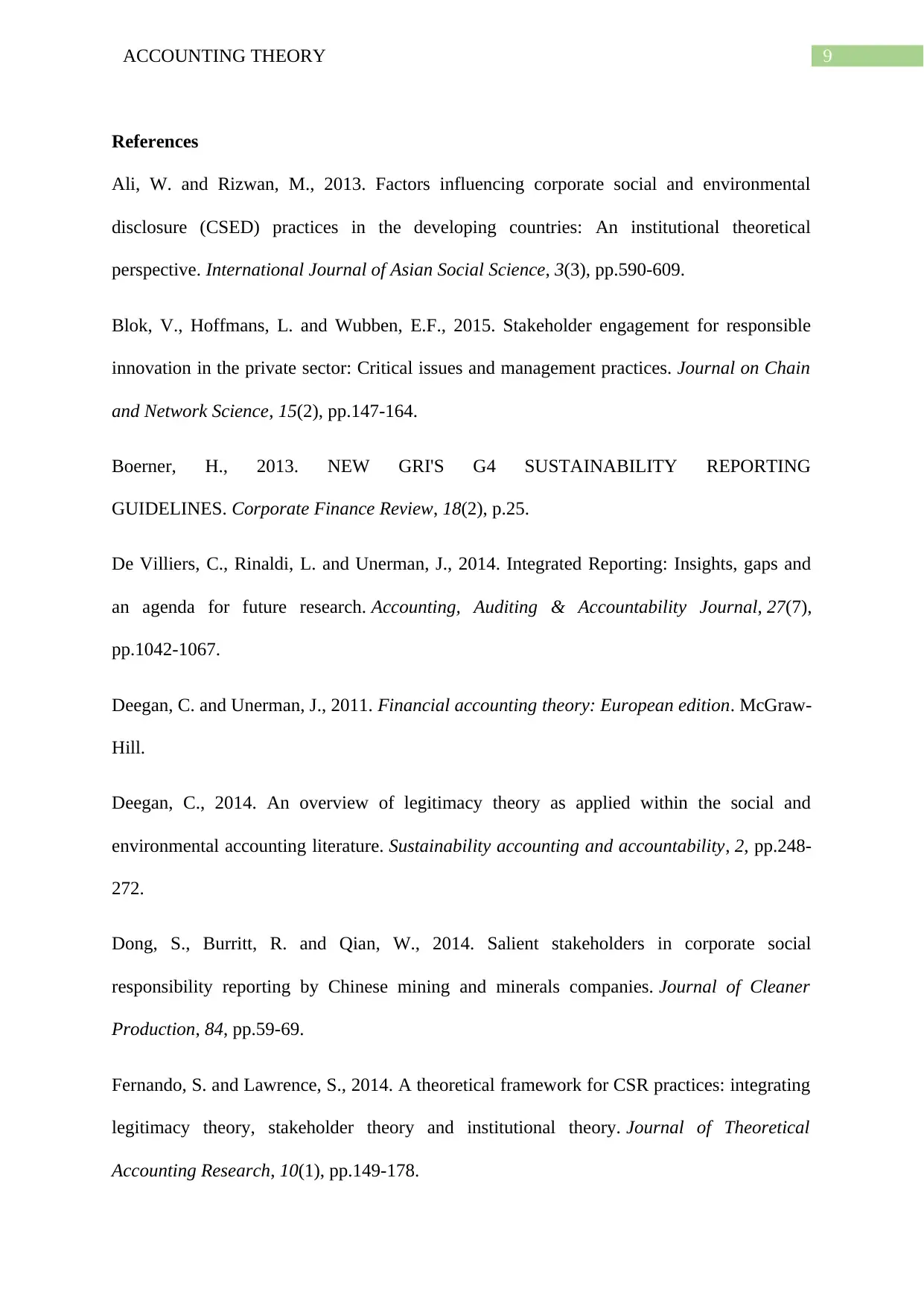
9ACCOUNTING THEORY
References
Ali, W. and Rizwan, M., 2013. Factors influencing corporate social and environmental
disclosure (CSED) practices in the developing countries: An institutional theoretical
perspective. International Journal of Asian Social Science, 3(3), pp.590-609.
Blok, V., Hoffmans, L. and Wubben, E.F., 2015. Stakeholder engagement for responsible
innovation in the private sector: Critical issues and management practices. Journal on Chain
and Network Science, 15(2), pp.147-164.
Boerner, H., 2013. NEW GRI'S G4 SUSTAINABILITY REPORTING
GUIDELINES. Corporate Finance Review, 18(2), p.25.
De Villiers, C., Rinaldi, L. and Unerman, J., 2014. Integrated Reporting: Insights, gaps and
an agenda for future research. Accounting, Auditing & Accountability Journal, 27(7),
pp.1042-1067.
Deegan, C. and Unerman, J., 2011. Financial accounting theory: European edition. McGraw-
Hill.
Deegan, C., 2014. An overview of legitimacy theory as applied within the social and
environmental accounting literature. Sustainability accounting and accountability, 2, pp.248-
272.
Dong, S., Burritt, R. and Qian, W., 2014. Salient stakeholders in corporate social
responsibility reporting by Chinese mining and minerals companies. Journal of Cleaner
Production, 84, pp.59-69.
Fernando, S. and Lawrence, S., 2014. A theoretical framework for CSR practices: integrating
legitimacy theory, stakeholder theory and institutional theory. Journal of Theoretical
Accounting Research, 10(1), pp.149-178.
References
Ali, W. and Rizwan, M., 2013. Factors influencing corporate social and environmental
disclosure (CSED) practices in the developing countries: An institutional theoretical
perspective. International Journal of Asian Social Science, 3(3), pp.590-609.
Blok, V., Hoffmans, L. and Wubben, E.F., 2015. Stakeholder engagement for responsible
innovation in the private sector: Critical issues and management practices. Journal on Chain
and Network Science, 15(2), pp.147-164.
Boerner, H., 2013. NEW GRI'S G4 SUSTAINABILITY REPORTING
GUIDELINES. Corporate Finance Review, 18(2), p.25.
De Villiers, C., Rinaldi, L. and Unerman, J., 2014. Integrated Reporting: Insights, gaps and
an agenda for future research. Accounting, Auditing & Accountability Journal, 27(7),
pp.1042-1067.
Deegan, C. and Unerman, J., 2011. Financial accounting theory: European edition. McGraw-
Hill.
Deegan, C., 2014. An overview of legitimacy theory as applied within the social and
environmental accounting literature. Sustainability accounting and accountability, 2, pp.248-
272.
Dong, S., Burritt, R. and Qian, W., 2014. Salient stakeholders in corporate social
responsibility reporting by Chinese mining and minerals companies. Journal of Cleaner
Production, 84, pp.59-69.
Fernando, S. and Lawrence, S., 2014. A theoretical framework for CSR practices: integrating
legitimacy theory, stakeholder theory and institutional theory. Journal of Theoretical
Accounting Research, 10(1), pp.149-178.
Secure Best Marks with AI Grader
Need help grading? Try our AI Grader for instant feedback on your assignments.
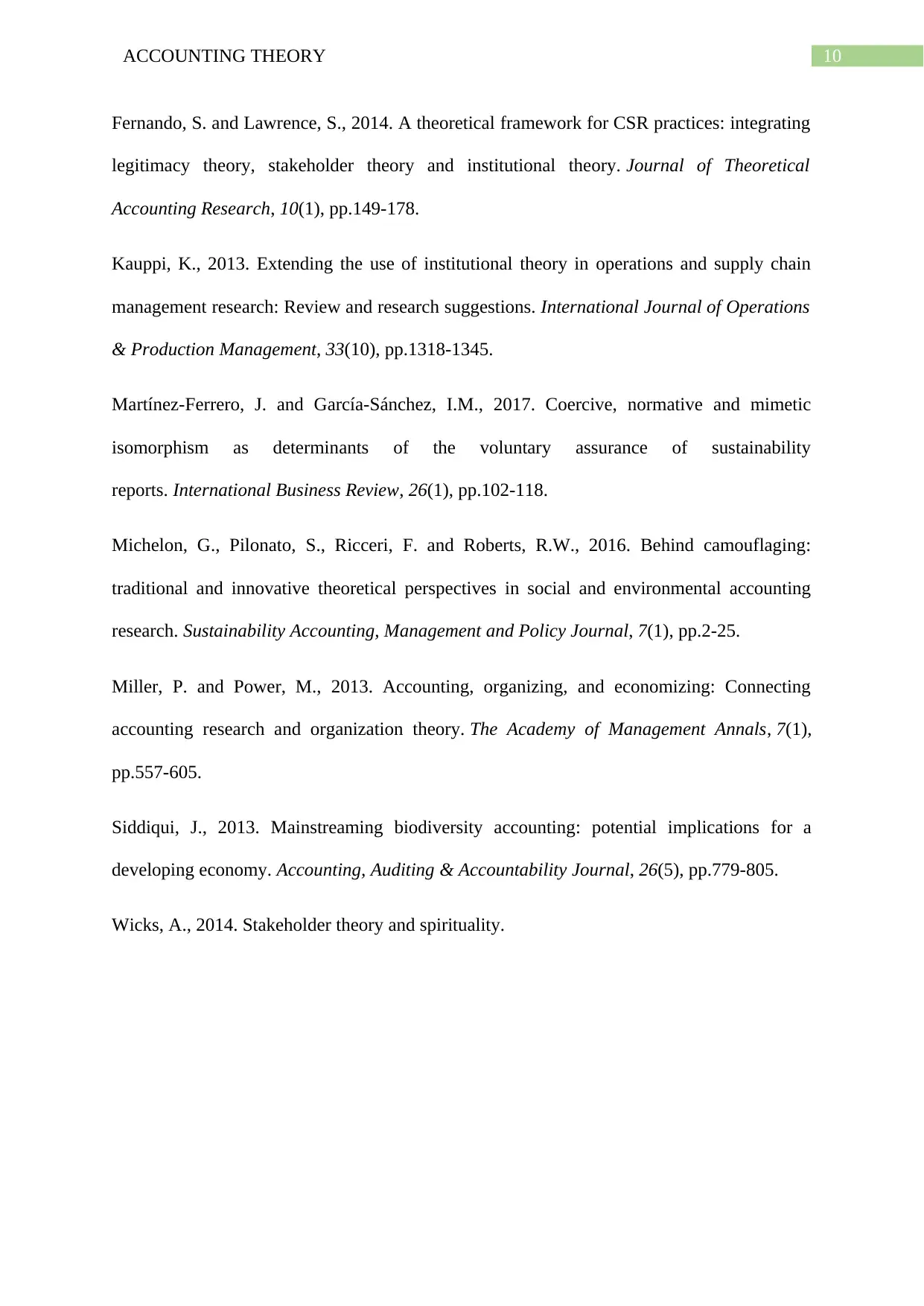
10ACCOUNTING THEORY
Fernando, S. and Lawrence, S., 2014. A theoretical framework for CSR practices: integrating
legitimacy theory, stakeholder theory and institutional theory. Journal of Theoretical
Accounting Research, 10(1), pp.149-178.
Kauppi, K., 2013. Extending the use of institutional theory in operations and supply chain
management research: Review and research suggestions. International Journal of Operations
& Production Management, 33(10), pp.1318-1345.
Martínez-Ferrero, J. and García-Sánchez, I.M., 2017. Coercive, normative and mimetic
isomorphism as determinants of the voluntary assurance of sustainability
reports. International Business Review, 26(1), pp.102-118.
Michelon, G., Pilonato, S., Ricceri, F. and Roberts, R.W., 2016. Behind camouflaging:
traditional and innovative theoretical perspectives in social and environmental accounting
research. Sustainability Accounting, Management and Policy Journal, 7(1), pp.2-25.
Miller, P. and Power, M., 2013. Accounting, organizing, and economizing: Connecting
accounting research and organization theory. The Academy of Management Annals, 7(1),
pp.557-605.
Siddiqui, J., 2013. Mainstreaming biodiversity accounting: potential implications for a
developing economy. Accounting, Auditing & Accountability Journal, 26(5), pp.779-805.
Wicks, A., 2014. Stakeholder theory and spirituality.
Fernando, S. and Lawrence, S., 2014. A theoretical framework for CSR practices: integrating
legitimacy theory, stakeholder theory and institutional theory. Journal of Theoretical
Accounting Research, 10(1), pp.149-178.
Kauppi, K., 2013. Extending the use of institutional theory in operations and supply chain
management research: Review and research suggestions. International Journal of Operations
& Production Management, 33(10), pp.1318-1345.
Martínez-Ferrero, J. and García-Sánchez, I.M., 2017. Coercive, normative and mimetic
isomorphism as determinants of the voluntary assurance of sustainability
reports. International Business Review, 26(1), pp.102-118.
Michelon, G., Pilonato, S., Ricceri, F. and Roberts, R.W., 2016. Behind camouflaging:
traditional and innovative theoretical perspectives in social and environmental accounting
research. Sustainability Accounting, Management and Policy Journal, 7(1), pp.2-25.
Miller, P. and Power, M., 2013. Accounting, organizing, and economizing: Connecting
accounting research and organization theory. The Academy of Management Annals, 7(1),
pp.557-605.
Siddiqui, J., 2013. Mainstreaming biodiversity accounting: potential implications for a
developing economy. Accounting, Auditing & Accountability Journal, 26(5), pp.779-805.
Wicks, A., 2014. Stakeholder theory and spirituality.
1 out of 11
Related Documents
Your All-in-One AI-Powered Toolkit for Academic Success.
+13062052269
info@desklib.com
Available 24*7 on WhatsApp / Email
![[object Object]](/_next/static/media/star-bottom.7253800d.svg)
Unlock your academic potential
© 2024 | Zucol Services PVT LTD | All rights reserved.





